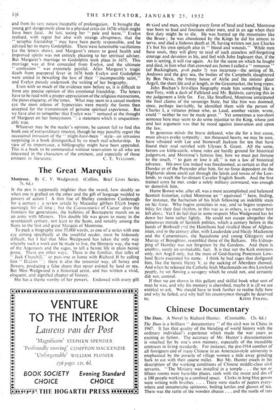The Great Marquis
IF the pen is supposedly mightier than the sword, how doubly so when one is grafted on the other and the gift of language wedded to powers of action ! A thin line of Shelley condemns Castlereagh for a century ; a review article by Macaulay gibbets Elijah Impey seemingly for all time ; but the commentaries of Caesar draw the frontiers for generations, the bulletins of Buonaparte march on as an army with banners. This double life was given to many in the seventeenth century, not least to the Scots, and notably among the Scots to the first and great Marquis of Montrose.
To pack a biography into 35,000 words, as one of a series with one eye aiming specifically at the youthful reader, must be hideously difficult, but I feel that Miss Wedgwood has taken the only way whereby such a work can be made to live, the Homeric way, the way of the Argonauts and the sagas, to tell a heroic life in plain heroic prose. There are other ways. There is the familiar, that talks of " Jack Churchill,– or puts one at home with Richard II by calling him " D:ckon " ; there is also the tonsorial way, all honey and flowers, produting a false sheen that never existed by land or sea. But Miss Wedgwood is a historical artist, and has written a vivid, eloquent, and dignified chapter of history.
She has a theme worthy of her powers. Endowed with every gift
at tiod and man, exercising every force of head and hand, Montrose was born to lead and fascinate other men, and in an age when their
first duty might be to die. He was hunted up the mountains like the Bruce ; he was abandoned by the Kings he did his utmost to serve, and died a hideous death at 38, having written not just Charles
I's but his own epitaph also in " blood and wounds." While men have souls, they will glory to read of such ceaseless self-forgetting courage and devotion as his, and feel with John Inglesant that, if the sun is setting, it will rise again. As for the scene on which he fought and died, in him what that crowned ass James I called a " romanzo " (of Buckingham, proh pudor !) was incarnate—the setting of St. Andrews and the grey sea, the bodies of the Campbells slaughtered by Ben Nevis, .the bonny house of Airlie and the, sinister glaur Argyll, the short life and at length, in the Grassmarket, the long ropes. John Buchan's first-tlass biography made him something like a neo-Tory, with a dash of Falkland and Mr. Baldwin, carrying this in my judgement a little far. For, like Strafford, Montrose anticipated the final claims of the sovereign State, but like him was doomed, since, perhaps inevitably, he identified them with the person of Charles 1, a virtuous prince who, as Laud, another victim, wrote, could " neither be nor be made great." Yet sometimes a too-short sentence here may seem to do some injustice-to the King, whose just and last argument was that he stood against innovation and upon the law.
In generous minds the brave defeated, who die for a lost cause, must always evoke sympathy ; ten thousand hearts, we may be sure, have vibrated with Lee and Stonewall Jackson for ten that have found their soul satisfied with Ulysses S. Grant. All the same, heroes are kittle-cattle, whose rules are hardly ground for historical judgement, and Montrose's famous line, how we must put fortune to the touch, " to gain or lose it all," is not a law of historical advance. His own fate indeed was foredoomed, as certain as that of Dundee or of the Pretender after him, for no force dependent on the Highlands alone could cut through the lairds and towns of the Low- lands, to reach the far-distant Cavalier English South. And the first trained army he met, under a solely military command, was enough to demolish him.
Hume Brown who, after all, was a most accomplished and balanced Scottish historian, called Montrose an " equivocal " hero, finding, for instance, the barbarism of his Irish following an indelible stain on his fame. Who begins atrocities in war, and so begins responsi- bility for their foul rhythm, in this war as in others, is a matter best left alone. Yet I do feel that in some respects Miss Wedgwood has let down her hero rather lightly. He could not escape altogether the poisonous morale of Scottish politics, which a century before in the hands of Bothwell crld the Hamiltons had rivalled those of Afghan- istan, and in the century after, with Lauderdale and bluidy Mackenzie and the Cameronians, the Squadrone and young Glengarry and Murray of Broughton, resembled those of the Balkans. His kidnap- ping of Huntley was not forgotten by the Gordons. And there is another, surely an unshakable, fact. It is that not the Kirk ministers only, net Argyll only, but the mass of God-fearing Protestant Low- land Scots execrated his name. I think he had rages that disfigured him, like the heroic Henry V, as the sacking of Aberdeen showed. And when he released the Catholic Irish Macdonalds on this Lowland people, he set flowing a savagery which he could not, and certainly did not, control.
If then we are shown in this gallant and skilful book what sort of man he was, and why his memory is cherished, maybe it is all we are entitled to ask. We should have to look further to realise fully how and why he failed, and why half his countrymen thought he deserved


































 Previous page
Previous page